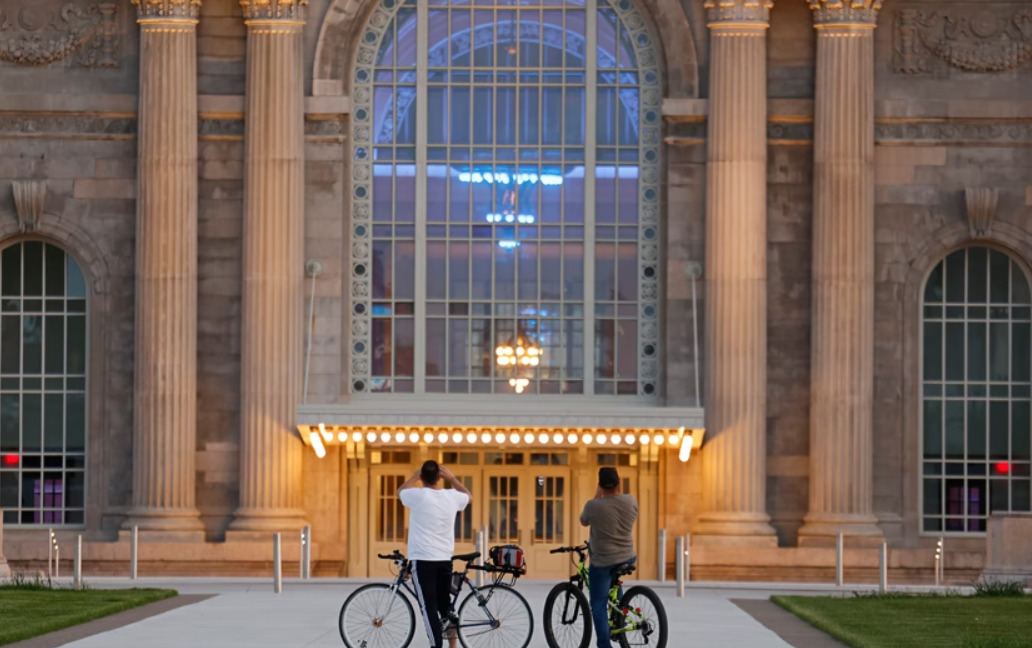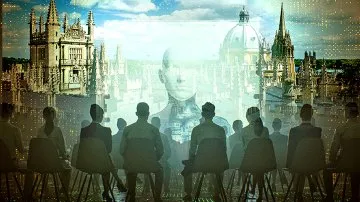
Erika Ayers Badan: Solving Food Insecurity One Dollar at a Time
This week, Erika talks with Allen Warch, Vice President of Food and Fresh at Dollar General, about how the company is transforming itself from a…
Thought Leader: Erika Ayers Badan

This piece is by WWSG exclusive thought leader, David Frum.
Fourteen years ago, I trespassed into what used to be Michigan Central Station in Detroit. The beaux-arts building had fallen into ruin since it closed to the public a generation before. It was fenced off for safety: Stairways were treacherous; floors were broken; opportunities to slash a foot or break a neck abounded. In this 2009 music video for the Eminem song “Beautiful,” you can see the station much as I saw it the following year.
The wreckage of Detroit’s train station symbolized the downfall of a once-great city.
That image still haunts Donald Trump’s imagination. This past weekend, Trump traveled to Detroit to rage against crime and disorder:
Look, the crime is most rampant right here and in African American communities. More people see me and they say, “Sir, we want protection. We want police to protect us. We don’t want to get robbed and mugged and beat up or killed because we want to walk across the street to buy a loaf of bread.”
But as often with Trump’s imagination, the image has fallen far behind reality.
On June 7, some 20,000 people attended a concert headlined by Detroit native Diana Ross to celebrate the reopening of the Michigan Central Station. The passenger hall has been lavishly returned to its original glory. The hotel that once rose above the station has been restored and repurposed as a retail and cultural space. A PBS camera crew led viewers through the renewed terminal, so you can see for yourself.
The rebuild was funded by private investment, principally from the Ford Motor Company. The investors will put the space to new use, as the anchor of a 30-acre technology hub near a residential district that’s being revived.
The reopening of the station capped a year of good news for Detroit. In 2023, the city’s population grew for the first time since 1957. Crime in the city plunged, with double-digit drops in carjackings and shootings—and the fewest homicides since 1966. Home prices rose faster than in any other city in the nation, surpassing the annual gain of more than 8 percent set by the previous front-runner, Miami.
Detroit remains a troubled place, certainly. But for the first time in a long while, its trajectory is clearly going up, not down.
As Detroit’s improvement is real, so Trump’s Detroit event was fake.
Trump’s team, and some stenographic news reports, described the event as taking place in a “Black church,” leaving the impression that he spoke to a church congregation. One of Trump’s talkers claimed that 8,000 people attended the event in a building that holds only a few hundred people when all the pews are full, which they weren’t. Trump’s media allies insinuated that the crowd was mostly made up of Black worshippers; the TV cameras showed a crowd that seemed at least half white and was apparently nonlocal.
The contrast between the reality of reviving Detroit and the falseness of Trump’s self-advertising symbolizes a challenge for voters and the media in this year’s presidential election. Trump tells stories that are not true. “Trump Portrays Rampant Crime in Speech at Black Church in Detroit,” was how The Washington Post headlined its story about the visit. Yes, that is what Trump portrayed. But the portrayal was deceptive.
The deception is one, though, that we are primed to accept. Our brains do not always adapt as quickly as the world can change. Nationwide, in 2024, crime is dropping; inflation is subsiding; real wages are rising—and rising fastest for the lowest-paid workers.
Yet the good news is taking time to register. Trump is racing against that time, with some success.
The United States has suffered two severe economic shocks in the past two decades: the Great Recession of 2008–09 and the pandemic shutdown of 2020–21. Recovery from the recession was slow and uncertain, and was followed by a wave of social troubles—the opioid epidemic, rising crime, and other pressures that Trump exploited in the 2016 election.
Recovery from the pandemic shutdown, however, has so far been rapid and strong. Has the memory of the first shock distorted our perception of the second? Or is some other barrier preventing us from seeing the world as it is?
The election of 2024—and the fate of American democracy—may turn on whether we can look past outdated stereotypes to grasp current realities.
Erika Ayers Badan: Solving Food Insecurity One Dollar at a Time
This week, Erika talks with Allen Warch, Vice President of Food and Fresh at Dollar General, about how the company is transforming itself from a…
Thought Leader: Erika Ayers Badan
Niall Ferguson: AI’s Great Brain Robbery
ChatGPT and its like have swept through academia, changing how students work, write and think. The bots are here to stay, so we need to…
Thought Leader: Niall Ferguson
David Frum: Canada-U.S. trade negotiations and Canadian nationalism
Leading author, journalist, and thinker David Frum and The Hub’s editor-at-large Sean Speer discuss the state of Canada-U.S. relations, including the ongoing trade negotiations as…
Thought Leader: David Frum

